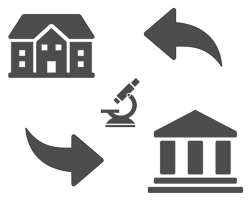You are here
Unfunded Agreement (UFA) Types
Approved NDA Templates
ORSP provides U-M's standard agreements and templates on the Standard Templates and Agreements page. Download and share these approved template agreements with potential research collaborators.
When routing an UFA to ORSP:
- ORSP PRs need to know if the PI has reviewed and agreed to the activities described in the UFA or PAF before attempting to negotiate.
- ORSP will return any UFA or PAF record for a contract if the PI signature is missing from it.
- Once approved and signed by the PI, ORSP will review and negotiate the agreement and have it signed on behalf of the University.
- Faculty, chairs, and departmental administrators do not have the authority to sign these agreements on behalf of the University. See U-M Standard Practice Guide (SPG) 601.24. Please work with ORSP.
Unfunded agreements have no associated external funding support. These agreements include items like NDAs, DUAs, MTAs, and other agreements. An "UFA" is a record in eResearch associated with these unfunded agreements.
Agreements are Legal Obligations
A contract or agreement involves promise(s) for which the performance is recognized as a legal obligation. Each contract document contains a performance obligation such as a statement of work (SOW) or a description of the services to be provided. The obligation should be drafted with great care, for failure by the University or contractor to deliver the results promised, or to perform what is defined in the SOW, is a breach of contract. All are legal contracts between two parties.
How to route an UFA to ORSP
All UFAs are routed for review and approval in the eResearch Proposal Management (eRPM) system.
To start a new UFA log into the eRPM system and click the button labeled "Create New UFA." Additionally, contact your ORSP project representative if you need a research-related agreement. If your U-M research will involve interactions with or funding from industry, ORSP will negotiate and sign your contracts on behalf of the University.
ORSP is committed to effectively and efficiently managing the contractual aspects of your research collaborations to advance research. See our mission.
Standard Templates and Agreements
Listed in the table below are types of unfunded agreements and who at U-M handles them, including Non-Disclosure Agreements (NDAs), Data Use Agreements (DUAs), Material Transfer Agreements (MTAs), and Other Agreements. Please also see our Standard Templates and Agreements for Download.
| Type of Agreement | Description | Handled by |
|---|---|---|
|
Non-Disclosure Agreements (NDAs)
|
A non-disclosure agreement (NDA) ensures that certain information disclosed in discussions are kept confidential and are only used for the limited purposes defined in the NDA. NDAs can also be referred to as confidentiality agreements (CA), or proprietary information agreements (PIA). Looking for a sample NDA? Visit our Standard Agreements and Templates page. Additional information regarding NDAs is here. Information regarding the Michigan Freedom of Information Act is here. Michigan FOIA. Also see the U-M Research Ethics and Compliance policy on the Research Integrity for further guidelines regarding acceptance and use of confidential information. |
|
|
Data Use Agreements (DUAs)
|
A DUA is needed any time there will be a transfer of data, a dataset or software that is non-public or is otherwise subject to restrictions on its use, a DUA may or may not consist of human subject data. Examples of DUAs include:
|
|
|
Material Transfer Agreements (MTAs)
|
Use an MTA when sending or receiving physical materials or software to/from a non-U-M entity. For further information about MTAs, please refer to the U-M Innovation Partnerships MTA website. |
|
|
Other Agreements
|
This category is a catchall for UFAs that do not fall into the above categories. Examples include:
|
With the following exception, ORSP handles all other unfunded agreement types.
|
FAQs
Generally, an unfunded agreement refers to a research-related agreement that does not have incoming dollars attached. U-M faculty researchers often engage in activities or collaborations that do not involve funding from Sponsors. These activities may include preliminary confidential discussions with potential research sponsors, requests for research materials from external sources, or data sharing consortiums.
Unfunded research activities are generally carried out under written contracts that set out each of the parties’ expectations and specific responsibilities. Coordination of unfunded research activities can be complex, and some may require University approvals for the use of University property, space, faculty effort, students, or compliance committee approvals for protocols involving human or animal subjects. UFAs are integrated into eRPM to allow the research community to more easily link corresponding agreements, monitor the status of UFA agreements, and communicate with administrative home and central offices.
- Familiar Format - The UFA system functions much like Proposal Approval Forms (PAFs) used to route sponsored research proposals in eRPM. Each type of UFA is an electronic smart form in eRPM (similar to the PAF worksheet) that is used to obtain administrative approval for an unfunded activity.
- Streamlined Workflow - Research Administrators and Principal Investigators no longer need to identify a central office project representative for UFAs. The UFA system routes your agreement based on smart form input.
- Paperless - The UFA system uses a smart form that eliminates the need to route paper. There will be no need to complete a material transfer form nor a need to obtain written signatures from the units or schools before submitting the request via eRPM.
- Broader Visibility and Access - As with PAFs, the approval status, agreement revisions and correspondence will be visible in the record. Track status of approvals, review and monitor negotiation activity, and upload communications and documents directly into the UFA file.
- Downloadable Templates - In an effort to better serve the research community and save them time and effort, ORSP provides downloadable standard agreement templates.
References and Resources
- Standard Templates and Agreements for Download ORSP provides U-M's standard agreements and templates on this page. Download and share these approved template agreements with potential research collaborators.
- eResearch Quick Reference Card - Unfunded Agreements (UFAs) PI/Project Team This is a quick reference card created by U-M Information Technology Services (ITS) for use on the eResearch Proposal Management (eRPM) system.
- Proposal Management Website: PI Sign UFA Reference Guide (ITS eResearch Documentation) Before the final agreement can be executed, the Contact PI must “sign” the UFA and a corresponding Conflict of Interest Statement before routing to ORSP. This process is completed using the Sign UFA activity in the UFA workspace and, again, this must be signed by the PI in advance of ORSP review.
- Proposal Management: Unfunded Agreements (UFA) Query (ITS Documentation for eResearch) For use by central offices.
Questions?
Contact the Private Sponsors Team with any questions.



